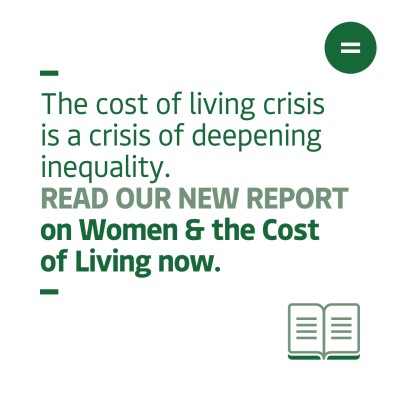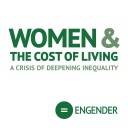Engender blog
The cost of living crisis and women: read our new report

Today Engender has released a report setting out how the deepening cost of living crisis will have a devastating impact both on different groups of women in Scotland, and on women's equality as a whole. Covering issues including fuel costs, unpaid care, housing, women's safety, mental health and social security, the report details how marginalised women will be disproportionately affected by this latest cost of living crisis. We make recommendations for immediate action to ensure that Scottish Government policy and budgetary responses to the cost of living do not risk entrenching gender inequality even more deeply in Scotland.
Crisis after Crisis, women pay the price
Women, particularly those facing intersecting marginalisation, pay the price in times of crisis because there is very little safety net when the fault lines of deep inequality in the UK are exposed. This is largely due to of a gendered ‘crisis of incomes’ across the UK that ensures women do not have equal access to financial resources compared with men. The egregious impact of the Covid-19 pandemic has already placed women at greater risk of economic insecurity, and the current cost of living crisis will further exacerbate women’s existing economic inequality, pushing many into poverty.
Higher prices, lower income, less security
While many people across Scotland are experiencing hardship as a result of the cost of living increases, women are far more likely to take responsibility for spending on children and purchasing non-durable items like food and domestic products that are susceptible to price hikes during periods of inflation. Alongside these increased costs, the UK Government decision not to uprate Universal Credit in line with inflation mean that hundreds of thousands of people in Scotland will experience a real terms income cut of £570 per year. Households impacted by the benefits cap face even more severe losses. Women are the majority of those on Universal Credit and impacted by the benefit cap.
Women make up the majority of many groups with high energy needs, including older people, disabled people, unpaid carers, and those looking after children in the home, and are also the majority of those in temporary work and on zero-hours contacts in Scotland. Soaring energy bills for households and business will therefore have a disproportionate impact on women, both as the managers of increasingly tight household budgets, and as those first in line to face unemployment, underemployment or the negative mental health impacts associated with precarious work.
Women experiencing domestic abuse are already often unable to leave abusive partners during to financial implications and economic coercive control, and this will only worsen along with the economic situation: 73 per cent of women experiencing domestic abuse said that the cost of living crisis had prevented them from leaving their abusive partner, or would make it harder to do so. Spiralling fuel costs and inadequate provision of public transport may also see women in remote and rural areas at risk of further isolation and gendered impacts on their safety and security (with higher transport costs in general also disproportionately impacting on disabled people, older people and unpaid carers, the majority of whom are women).
What needs to happen?
We're calling on Scottish Government to provide targeted support for women and girls on low incomes and in precarious situations, and to ensure that the needs of all groups of women and girls are mainstreamed in strategic interventions that respond to the cost of living crisis. Our recommendations are:
1. Apply rigorous intersectional gender budget analysis to the Emergency Budget Review and all other budgeting processes that respond to the cost of living crisis;
2. Uprate all social security payments delivered by Social Security Scotland in line with the rate of inflation as a matter of urgency;
3. Fast-track delivery of automatic individual payments of Universal Credit in Scotland from the outset of the claim;
4. Increase the Scottish Child Payment to £40 per week;
5. Provide an emergency boost to the Scottish Welfare Fund of 50% (£17.75m), promote uptake, and broaden parameters for its use;
6. Double forthcoming instalments of the Carers Allowance Supplement and provide targeted funds for young carers;
7. Accelerate plans to abolish non-residential social care charges;
8. Ensure that the 1140 hours of funded childcare is flexibly delivered, increase support for school age children, and map a course towards universal access to 50 hours per week;
9. Ensure that all public sector wages rise in line with the rate of inflation;
10. Increase protection for women experiencing domestic abuse and their children;
11. Establish a gendered action plan on medium-term housing security for those in rented accommodation, including targeted support with housing costs for those most in need;
12. Act to fill evidence gaps and prevent destitution for the most marginalised women in Scotland, including those with no recourse to public funds;
13. Invest in gendered mental health services and fully mainstream intersectional gender analysis throughout the new Mental Health and Wellbeing Strategy;
14. Prioritise and invest in its commitment to bring forward a new Human Rights Bill that would directly incorporate CEDAW into Scots law.
You can see the full report for further details on these recommendations here, and find out more about our work on the cost of living here.
Share this post on …
Comments: 0 (Add)
Downloads
 Women & the Cost of Living: A Crisis of Deepening Inequality
The escalating cost of living crisis will result in untold harm in Scotland, particularly for women, other oppressed groups and those living with multiple inequalities.
Women & the Cost of Living: A Crisis of Deepening Inequality
The escalating cost of living crisis will result in untold harm in Scotland, particularly for women, other oppressed groups and those living with multiple inequalities.

Newsletter
Sign up to receive our newsletter here:
Sign up to our mailing list
Receive key feminist updates direct to your inbox: